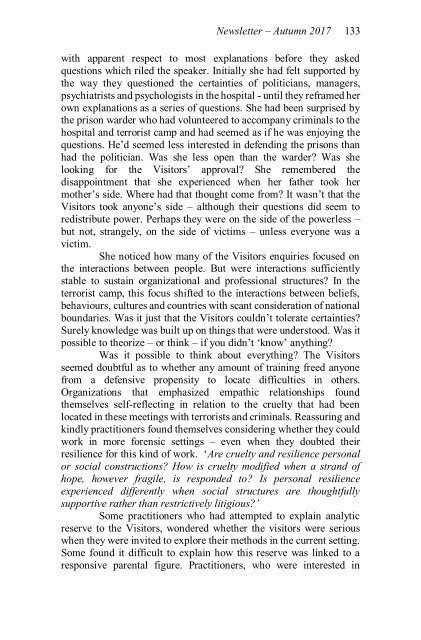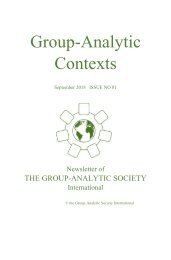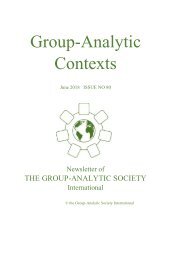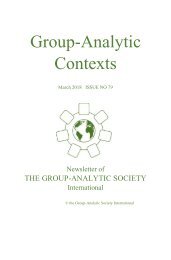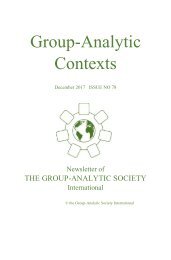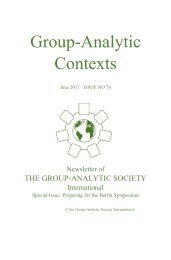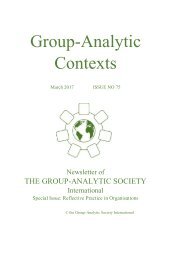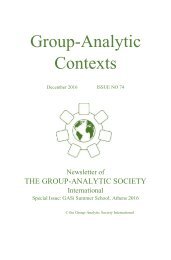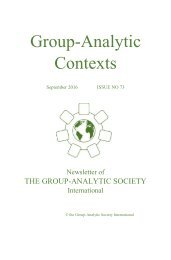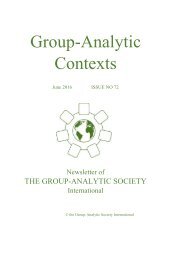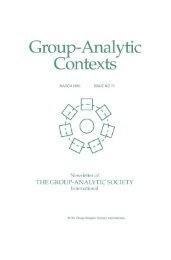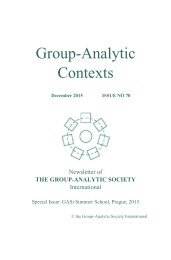Group Analytic Contexts, Issue 77, September 2017
Newsletter of the Group Analytic Society International
Newsletter of the Group Analytic Society International
You also want an ePaper? Increase the reach of your titles
YUMPU automatically turns print PDFs into web optimized ePapers that Google loves.
Newsletter – Autumn <strong>2017</strong> 133<br />
with apparent respect to most explanations before they asked<br />
questions which riled the speaker. Initially she had felt supported by<br />
the way they questioned the certainties of politicians, managers,<br />
psychiatrists and psychologists in the hospital - until they reframed her<br />
own explanations as a series of questions. She had been surprised by<br />
the prison warder who had volunteered to accompany criminals to the<br />
hospital and terrorist camp and had seemed as if he was enjoying the<br />
questions. He’d seemed less interested in defending the prisons than<br />
had the politician. Was she less open than the warder? Was she<br />
looking for the Visitors’ approval? She remembered the<br />
disappointment that she experienced when her father took her<br />
mother’s side. Where had that thought come from? It wasn’t that the<br />
Visitors took anyone’s side – although their questions did seem to<br />
redistribute power. Perhaps they were on the side of the powerless –<br />
but not, strangely, on the side of victims – unless everyone was a<br />
victim.<br />
She noticed how many of the Visitors enquiries focused on<br />
the interactions between people. But were interactions sufficiently<br />
stable to sustain organizational and professional structures? In the<br />
terrorist camp, this focus shifted to the interactions between beliefs,<br />
behaviours, cultures and countries with scant consideration of national<br />
boundaries. Was it just that the Visitors couldn’t tolerate certainties?<br />
Surely knowledge was built up on things that were understood. Was it<br />
possible to theorize – or think – if you didn’t ‘know’ anything?<br />
Was it possible to think about everything? The Visitors<br />
seemed doubtful as to whether any amount of training freed anyone<br />
from a defensive propensity to locate difficulties in others.<br />
Organizations that emphasized empathic relationships found<br />
themselves self-reflecting in relation to the cruelty that had been<br />
located in these meetings with terrorists and criminals. Reassuring and<br />
kindly practitioners found themselves considering whether they could<br />
work in more forensic settings – even when they doubted their<br />
resilience for this kind of work. ‘Are cruelty and resilience personal<br />
or social constructions? How is cruelty modified when a strand of<br />
hope, however fragile, is responded to? Is personal resilience<br />
experienced differently when social structures are thoughtfully<br />
supportive rather than restrictively litigious?’<br />
Some practitioners who had attempted to explain analytic<br />
reserve to the Visitors, wondered whether the visitors were serious<br />
when they were invited to explore their methods in the current setting.<br />
Some found it difficult to explain how this reserve was linked to a<br />
responsive parental figure. Practitioners, who were interested in


